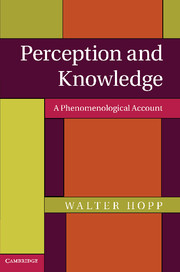Book contents
7 - To the things themselves
Published online by Cambridge University Press: 21 April 2011
Summary
There are three main and interrelated tasks involved in spelling out the role of perception in knowledge. The first is to determine whether perceptual experiences justify beliefs. The second is to say why they do (or do not do) so. The third, assuming that experiences justify beliefs, is to specify how they do so. In the present chapter I will attempt to do all three, with special emphasis on the last. More specifically, I will present and defend a modified version of Husserl's theory of fulfillment, which I believe is the best available account of how perceptual and other intuitive experiences relate to thoughts.
In light of the results of the previous chapters, we have some idea what form the answers to these questions will take. Most importantly, we know that while perceptual experiences have the same sorts of objects as some thoughts, they have a radically different kind of intentional content. Perception is not thought with a sprinkling of qualia. And it is not, as the relational view contends, the sheer, content-free awareness of physical objects. Perception, rather, harbors “interwoven masses of intentions” (LI 6, §16: 721), whose contents are either intuitive, horizonal, or both – but not conceptual. And because the contents of perception are so different from those of thought, we can expect that the relation between perceptual states and beliefs will be quite different from that among beliefs (Mulligan 1995, §10.2).
- Type
- Chapter
- Information
- Perception and KnowledgeA Phenomenological Account, pp. 190 - 225Publisher: Cambridge University PressPrint publication year: 2011



